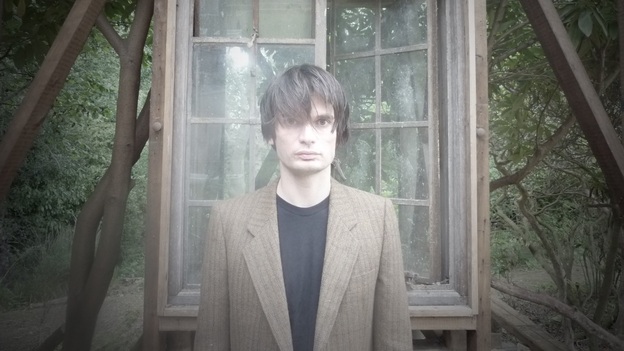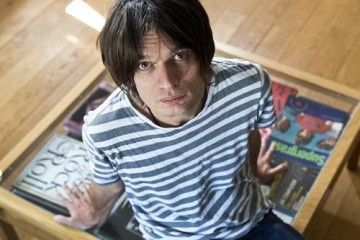“Pourquoi l’avenir appartient au classique”
Jonny Greenwood jouera à Glastonbury vendredi soir avec le London Sinfonietta. Voici un article paru aujourd’hui dans le Times de Londres, gentiment scanné par un fan à qui je l’ai demandé car il n’est pas disponible aux non-abonnés (si vous avez accès à la base Factiva, vous pouvez le lire directement).
Après des protestations d’incompétence auxquelles nous sommes habitués (cet homme ne prendra donc jamais confiance en lui?), il revient sur son goût pour toutes les musiques qu’il a cultivé dès l’enfance et répète son enthousiasme pour la performance live. A la question rituelle concernant notre soif à tous de Radiohearie, il avoue que leur année off vient à son terme et qu’il est bien temps qu’ils se retrouvent un peu ensemble: “on a vraiment besoin de se voir et de travailler ensemble. On s’est vu séparément pendant cette année, mais on ne s’est jamais retrouvé tous ensemble. Il semble qu’on ne sache pas du tout où on va aller, mais je suppose que c’est pour ça que ça continue d’être intéressant.”
Sur “Water”, l’oeuvre classique qu’il a écrite pendant sa résidence en Australie, on saura juste qu’il a travaillé à partir d’un poème de Clive James, un auteur australien mais qu’il n’a pas réussi à sonner vraiment australien…
Référence de l’article: http://www.thetimes.co.uk/tto/arts/music/article4128910.ece
Jonny Greenwood: why the future is classical
The over-modest Radiohead guitarist is carving out a parallel role as a composer of contemporary classical music
In the secluded garden of a restaurant in north Oxford, Radiohead’s Jonny Greenwood is looking anxious. “As a guitarist I feel semi-fraudulent, like I’m bluffing,†he says, scrunching his trademark floppy fringe — still lustrous after all these years. “If I went and played guitar in another band, people would realise what I’m really doing. I mean, I enjoy it hugely. But it’s all very limited. I’m not holding anything back. I don’t have any skills.â€
Greenwood, 42, stresses that this isn’t false modesty (“which I hateâ€). Most probably it’s a reaction to the company he’s been keeping lately, of which more below. Nevertheless, the man Spin magazine recently ranked as the 29th greatest guitarist of all time is so polite and self-effacing it’s hard getting him to take credit for anything.
The younger brother of Radiohead’s bass player, Colin, Greenwood has for several years now been carving out a parallel role as a composer of contemporary classical music. As long ago as May 2004 he was appointed composer-in-residence for the BBC Concert Orchestra. The series of pieces he subsequently produced — the mystical, sumptuous smear; the swarming-bees drone of Popcorn Superhet Receiver, which won the Radio 3 Listeners’ Award at the 2006 BBC British Composer Awards — made it clear that this was not a case of the BBC indulging pop-star dilettantism. Greenwood’s latest classical work Water, a piece for strings, piano and tamboura (an Indian drone instrument), will have its world premiere in Dublin in October, before the Australian Chamber Orchestra led by Richard Tognetti brings it to London and Birmingham. Before that, this Friday, Greenwood performs Steve Reich’s Electric Counterpoint with the London Sinfonietta at Glastonbury.
Greenwood acknowledges the murky history of rock stars dabbling in classical music, observing that “classical music†in this context usually means a type of romantic symphonic music last written in the 1880s. “Still,†he chuckles, “I can’t talk. My ideas end in 1960 so I’m already over 50 years out of date.â€
There’s truth in this but, even so, a piece like Greenwood’s 48 Responses to Polymorphia is barely on the same spectrum as, say, Sir Paul McCartney’s Liverpool Oratorio. A better comparison — though not hugely helpful, as their music is very different — would be Frank Zappa, who by the time of his death in 1993 was being fêted, for works such as The Yellow Shark, alongside John Cage and Karlheinz Stockhausen.
Where the comparison holds is that, like Zappa, Greenwood has been mostly embraced by a notoriously snarky scene that likes to eat fledgling composers for breakfast. In this world, Greenwood’s celebrity counts for little. Orchestral musicians are not impressed by pop stars, regarding them in the main as useful idiots — sources of the all-important session work they are obliged to take on to boost their meagre incomes.
In this world, Greenwood’s fame could easily count against him. Yet he is taken seriously, discussed in the same breath as hotshot composers such as Mica Levi and Edmund Finnis, who work across a number of genres comfortably without ever being “crossover†because they have the skills to cut it whether they’re making music for bedrooms, dancefloors or concert halls.
That Greenwood should have this ability isn’t a surprise — if you know your Radiohead. The broad sonic palette that has made them the most consistently interesting rock band of the past 20 years reflects Greenwood’s fascination with microtonal tunings and eccentric instruments such as the ondes Martenot, a theremin-like electronic device beloved of Olivier Messiaen. His love for early to mid 20th-century composers such as Messiaen, György Ligeti and especially Krysztof Penderecki is gorgeously apparent in the icy, shuddering strings on How to Disappear Completely on the Radiohead album Kid A and the ethereal flugelhorn arrangement on Bloom from their most recent album, 2011’s The King of Limbs.
In 2007 Greenwood’s solo work found a wider audience when he wrote the score for Paul Thomas Anderson’s film There Will Be Blood. (He will play the ondes Martenot part at the Roundhouse in north London on August 6 and 7, when the film is screened with the score played live.) He has since scored several other films, including two more for Anderson: 2012’s The Master and the forthcoming Thomas Pynchon adaptation Inherent Vice.
Greenwood’s classical-music epiphany came at the independent Abingdon School, which all of Radiohead attended, when his music teacher put on a Messiaen record during a lesson. But he never made a distinction in his listening habits between rock, jazz and classical. “As a teenager I quite unconsciously connected all the music I liked,†Greenwood explains. “I thought of all my favourite records as being my favourite records regardless of who made them or how they were recorded. So I wasn’t afraid to emulate them all, no matter how far beyond my reach they were. Why not think of them as the same thing?†He pauses, then answers his own question. “Actually, I think most people do. What I love about touring is that when we stay in hotels you get to see other guests’ iTunes libraries. You see Metallica, Dolly Parton, Coldplay — all this different stuff mixed up together.’
Greenwood went out to Australia for a three-month residency with the ACO and Tognetti and worked closely on the composition with the ensemble, an experience he calls a “dream come trueâ€.
“The plan was to write something based on a Clive James poem, because I love Clive James, but it felt like I was shoehorning something in, so in the end I couldn’t make the piece as Australian as I was probably meant to.â€
Greenwood calls himself a “semi-semi-competent†string player, but again, this is how any non-professional musician would feel after spending three months with the virtuosic ACO. In fact, he played the viola in Thames Vale Youth Orchestra and studied music at A level, quitting his Oxford Brookes University degree course in music and psychology when Radiohead signed to EMI in 1991. Unlike most rock musicians, he can read and write music, though he occasionally seeks help from the conductor-arranger Robert Ziegler: “I’ll show it to Robert and he’ll say, ‘That’s too high for a horn to play’. My formal music education stopped when I left school.â€
We talk about the pianist Glenn Gould, who strove for crazy levels of perfectionism in his studio recordings and believed live performance, which he hated, would be redundant by the end of the 20th century. Greenwood, by contrast, and despite the fact that he is an accomplished programmer who writes all the software that Radiohead use in the studio, has grown to mistrust recorded music and is an ardent evangelist for live performance: “Music has been cheapened by its omnipresence. You no longer have to seek it out — it’s like a burst bank. Which is why it’s so immediate and powerful to hear, say, a string quartet playing live.
“Live classical music feels very modern to me for some reason, even though the instruments are old. Almost all of the musicians I meet are utterly without ego, and yet they’re so skilled and have devoted so much of their lives to sounding the way they do. Whenever I see someone outside Abbey Road studios carrying a cello case, I think they’re amazing. Then I see someone carrying a guitar and I just sort of think . . .†He tails off, shrugging his indifference.
Fans worried that the success of his extracurricular ventures has left Greenwood any less committed to Radiohead need not fear. The band’s year-long break is coming to an end and they are about to meet up to discuss the next record. “We just need to get together and hang out and talk. We’ve seen each other individually over the past year, but not all together.†Is there a plan? No, says Greenwood, laughing. “It still feels like we don’t really know what we’re doing. Which is why it’s still fun, I suppose.â€
London Sinfonietta + Jonny Greenwood, 3 July, The Bridgewater Hall, Manchester.The Australian Chamber Orchestra performs Jonny Greenwood’s Water at the Queen Elizabeth Hall, London SE1, on October 4 and Symphony Hall, Birmingham, on October 5




1 Comment